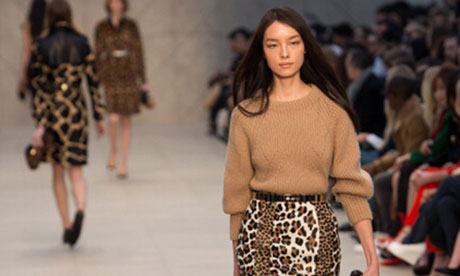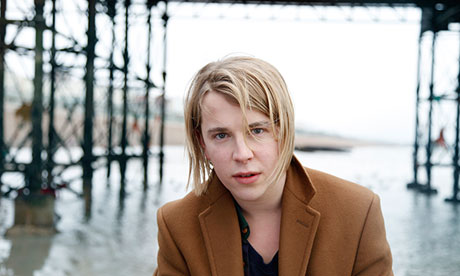Burberry's Christopher Bailey on his obsession with music
For Burberry's chief creative officer, music is so important that the company now has its own full-time music team. The designer explains how his musical obsession drives his fashion work
by Laura Barton source: http://www.theguardian.com/fashion/2013/sep/04/christopher-bailey-music-burberry-fashion
Since his arrival at the label in 2001, Bailey has made it something of a mission to entangle the worlds of fashion and music. It's there in the soundtracks to the shows of course, but also in the brand's advertising campaigns, featuring musicians such as Bryan Ferry, Patrick Wolf and Jack Bevan from Foals, George Barnett from These New Puritans and in a series of video performances by emerging and established artists named Burberry Acoustic.
The story of how Odell came to play such a key role in last February's show is not atypical. His music had been introduced to Bailey somewhere along the line – one of the many emailed links, demos, personal recommendations he receives each week. But Bailey had found himself so quickly smitten that by the time he was planning February's catwalk show, "I was just obsessively listening to his music. And even if I was listening to something else, I was listening to something that might've been in the Tom world … do you know what I mean?" he asks, looking faintly embarrassed, sitting on the edge of the sofa in his office at Burberry headquarters in London. "That weird musical obsession that you get, like a teenager."
 Bailey lined up Tom Odell to perform at the Burberry Prorsum autumn/winter show earlier this year. Photograph: Ian Gavan/Getty Images
Bailey lined up Tom Odell to perform at the Burberry Prorsum autumn/winter show earlier this year. Photograph: Ian Gavan/Getty Images
It was, he explains, Odell's "sincerity and authenticity" that appealed. "I love that he's intense and I love that he believes in it and he's not playing at this. It's almost, I feel, more powerful than he is. It's transporting him."
When they met, he found Odell "warm, not introverted, but like a lot of musicians, quite awkward. He's not naturally gregarious and vivacious or demonstrative." But he saw too how Odell seemed to come alive when he played. "In his body language and everything – he becomes so intense and focused," Bailey says. "It's where everything kind of comes together."
There is a sweet inarticulacy to Bailey when it comes to speaking about music. "I find it very difficult talking about it," he apologises, "which is not helpful for this conversation. But it's because it's not tangible. It's like anything that's emotional, it's a feeling. But it's like the weather, it affects the spirit of everything."
And so our conversation is littered with words such as "authentic" and "emotive" and "organic", as if he is grasping desperately for the language to express his great passion. He talks about the transformative musical moments of his 42 years – his first gig at the age of 15, watching Bob Dylan, of those late teenage years driving around his native Halifax with his best friend, listening to cassette tapes. Of the Cure, and the Damned, Neil Young, Leonard Cohen, Joni Mitchell, Tracy Chapman, Everything But the Girl, Alison Moyet, Julia Fordham and Joan Armatrading, to whom he listens "probably every week".
But it is when he begins to explain the tactile effect of music that he grows more articulate. "I've always loved a pure voice or a pure instrument," he says at one point. "One of my favourite Elton John tracks is Skyline Pigeon. You just hear his voice and that piano and it kind of makes you crack inside, it's so beautiful. I actually love it when you hear someone's voice break," he says. "It suddenly feels like there's nothing else there but you and a voice." He looks faintly nervous, as if he might have said something silly, but I think there is something rather fitting about a fashion designer who experiences music as texture and sensation.
When he tells me later about asking Odell to perform at the catwalk show he recalls how he gave the musician notably tactile instructions: "I said this is a fashion show, and you've got, you know, girls walking up and down, but I want people to feel the music – I want them to have that feeling where the hairs on the back of your neck stand up. Because that's how I feel when I listen to music."
 British singer/songwriter Tom Odell: Bailey was impressed with his 'sincerity and authenticity'.
British singer/songwriter Tom Odell: Bailey was impressed with his 'sincerity and authenticity'.
It is music, he says, that "definitely, often, usually" before anything else "sets the directional mood for what we're working on." Though this often seems to happen subconsciously. "You listen to a piece of music, and something sticks but you don't realise," he says. "And you start working on things and it tends to permeate everything you're then doing at that moment."
It is in fact now such a key part of the Burberry process that the company now has its own full-time music team — two people who "really are musos" with whom Bailey can have "the most random conversations that I would be embarrassed to have with anybody else. I can talk to them about a feeling or a particular kind of voice and they will just suggest an artist."
It is the music team that also steers Burberry's ongoing commitment to emerging musicians — not just with projects such as Burberry Acoustic but, as Bailey is keen to explain, in the way that the company "work on a lot of things that we don't show with musicians, matching artists up with the right management and record labels and things. It's a very authentic relationship, they know that we respect them."
It is in many ways an extension of the role Bailey has carved out for himself in the worlds of art and architecture, as well as fashion, nurturing young talent and burgeoning creativity from his work with the label's youth charity the Burberry Foundation, to his role as mentor at a number of institutions, from the Royal College of Art to the University of Huddersfield. "It's what I enjoy," he explains. "It's really selfish. But I'm in a really privileged position to do it. And my dream was always to build a design school that has all the different worlds that make you feel – from the design of clothes or a pair of sunglasses or shoes or bags, to furniture, architecture, web design, event design, physical space design, retail and offices, to packaging and video and photography, print, colour, textiles, music. Because they're all the senses. That's what I try to build up. Because I love working with people that feel and that care."
This is not perhaps a conventional route for a fashion design company, but it seems to be successful – last year, Burberry's total revenue was £2bn, with retail revenue up 12% and it now has a total of 533 stores worldwide, including the 44,000 sq ft flagship store in London. "Lots of people think that as a big public company your whole reason to be is about the business and about finance," Bailey says. "But actually I feel that if you have a spirit and a point of view, if you have people who are united and are joyously doing something that they love … well, then it's like the chicken and egg," he smiles. "It's nothing to do with money. It's just something that we love to do. It makes you real. And it's not cynical. We're not trying to flog things off the back of these things."
Back at Kensington Gardens last February, the day before the catwalk show, Bailey stood to watch Odell rehearse. "It was about four o'clock in the afternoon," he remembers. "There were technicians, lighting people, photographers preparing, cleaners cleaning … it was a chaotic thing. But then Tom started to play and the whole place just went completely silent and stood still. And I stood there, trying not to show that I was getting a bit emotional – but it was just one of those moments: Tom could've been at home alone in his bedroom, he just completely went into lockdown, into what he was doing. He completely made sense, and I was just blown away."
I wonder where Bailey, sitting atop this business empire, this design school, this great swirl of fashion and music and art, feels he makes most sense. He frowns. "I guess it's in those moments – whether you're fitting the collections or whether you're working on a building or whatever kind of thing you're doing, where everything becomes so unimportant because that feeling, that idea is so powerful," he says. "You might have tonnes of worries about other things and you're really crazed and you're busy and life is chaotic. But all of a sudden you don't care about anything else. That example of Tom playing in rehearsal was one of them. Nothing else mattered. And those moments you have to cherish'
No comments:
Post a Comment